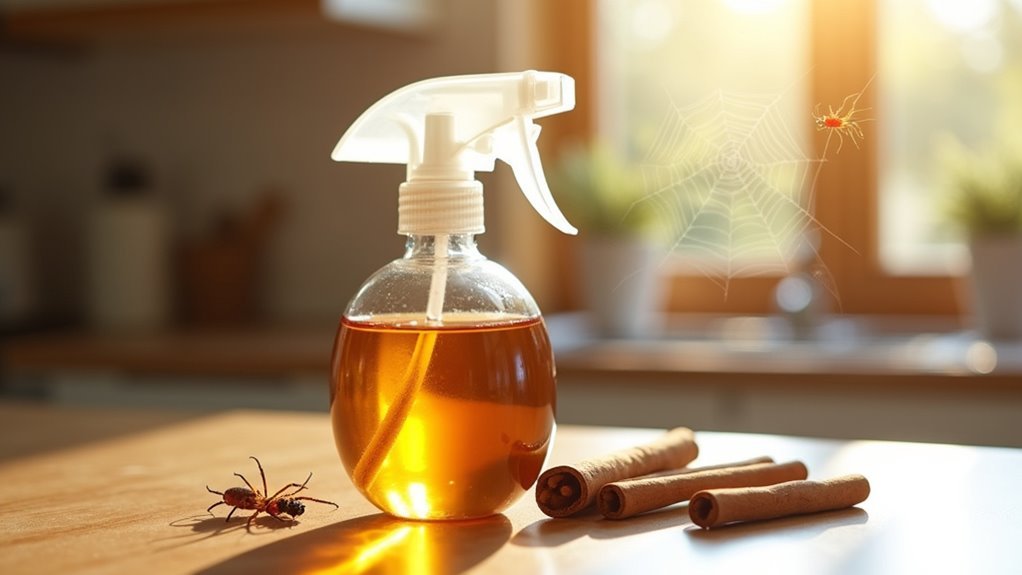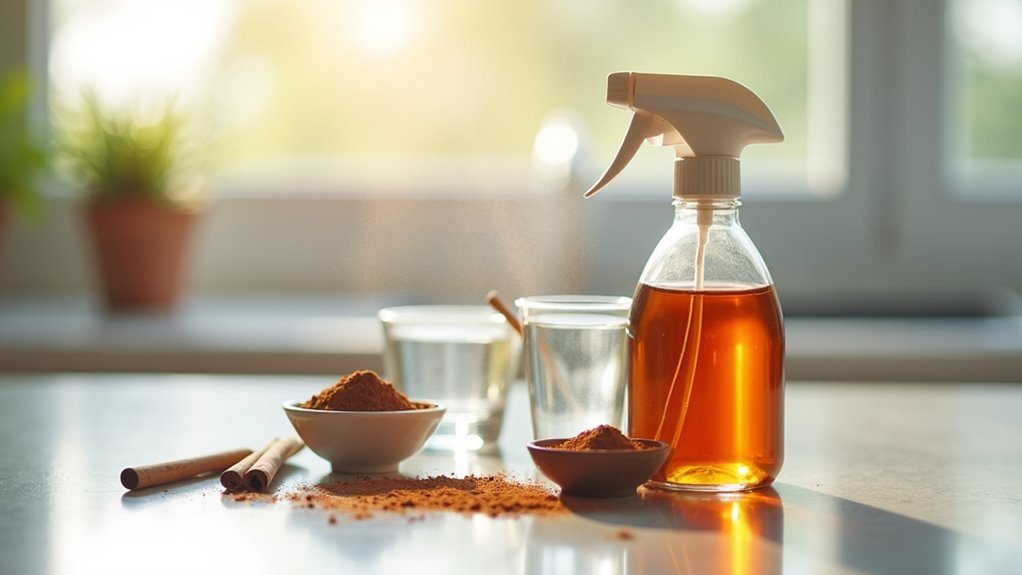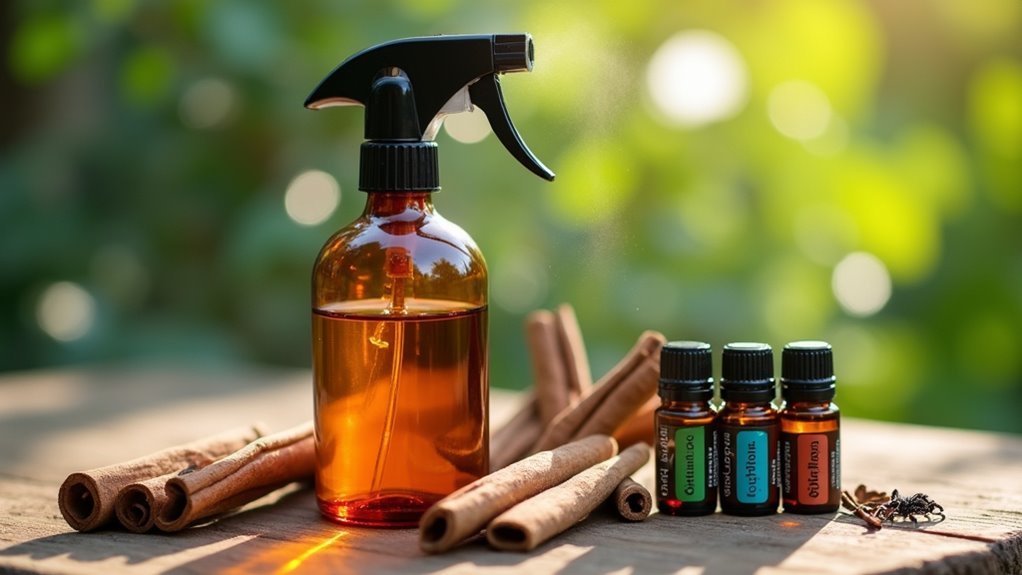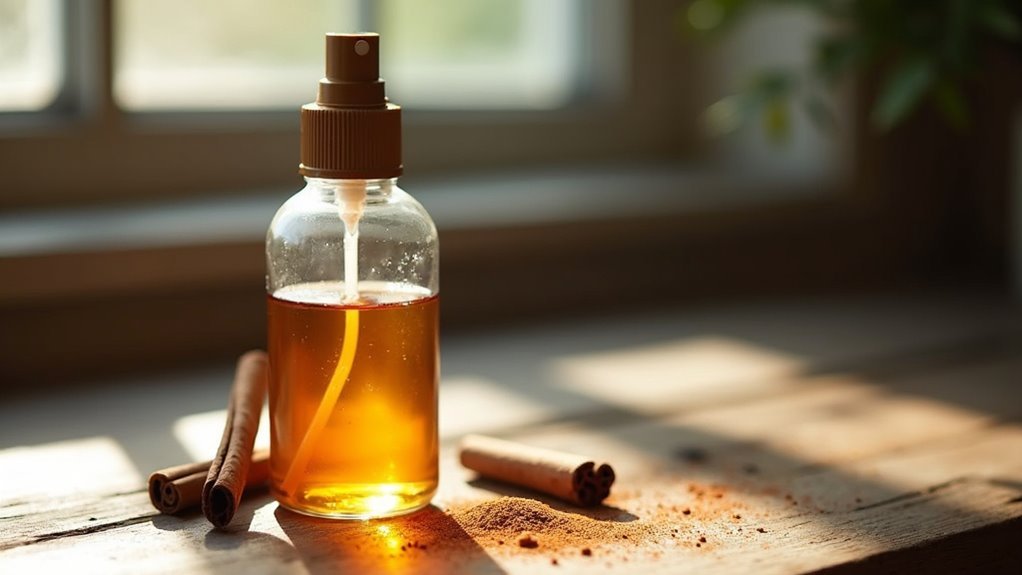You can create an effective spider deterrent by mixing 10-15 drops of pure cinnamon oil with one cup of water in a spray bottle. The strong cinnamon scent irritates spiders’ sensitive sensory systems while creating a mechanical barrier they’ll avoid. Shake well before each use and spray around entry points like windows, doorways, and dark corners where spiders typically hide. This chemical-free solution offers a safe alternative to commercial pesticides, and there’s much more to discover about maximizing its effectiveness.
Why Cinnamon Works as a Natural Spider Deterrent

While commercial spider sprays flood the market with harsh chemicals, cinnamon offers a natural alternative that works through multiple mechanisms to keep these eight-legged visitors at bay.
You’ll find that cinnamon’s strong scent actively irritates spiders’ sensitive sensory systems, making your treated areas uninviting to them. The fine powder creates a mechanical barrier that causes discomfort when spiders attempt to cross it, functioning as an effective deterrent.
When you’re choosing between natural deterrents, cinnamon oil proves more potent than ground cinnamon due to its concentrated fragrance. This makes it ideal for creating powerful homemade spider repellent sprays.
Though scientific research remains limited, cinnamon’s proven insecticidal properties and irritative effects explain why it’s become a popular natural pest control method among homeowners seeking chemical-free solutions.
Essential Ingredients for Your Cinnamon Spider Spray
Creating your own cinnamon spider spray requires just a few simple ingredients that you likely already have at home. The key component is 100% pure cinnamon oil, which provides the active compounds needed to repel spiders effectively. Synthetic versions won’t deliver the same potent results as pure oil.
Pure cinnamon oil contains the essential compounds that make spiders flee, while synthetic alternatives simply won’t deliver the same powerful repelling effects.
Here’s what you’ll need for your natural pest control solution:
- 100% pure cinnamon oil – 10 to 15 drops for maximum effectiveness
- Water – Fill your spray bottle as the base liquid
- White vinegar – Optional addition for enhanced spider-repelling power
- Spray bottle – Clean container for easy application
You’ll want to verify your cinnamon oil is authentic since this natural pest deterrent relies on genuine essential oils to create an environment spiders avoid.
Step-by-Step Cinnamon Spray Recipe Instructions

Now that you have your ingredients ready, let’s walk through the simple process of making your cinnamon spider spray.
Add 10 to 15 drops of 100% pure cinnamon oil to 1 cup of water in a spray bottle. Shake the bottle well before each use to guarantee even distribution throughout the mixture.
Target spider-prone areas by applying the solution around entry points like windows, doorways, and dark corners where spiders typically hide.
For enhanced effectiveness as a natural spider deterrent, you can combine the cinnamon oil with vinegar in your mixture.
Apply the spray regularly to maintain its spider-repelling properties. The strong cinnamon scent will effectively repel spiders and help keep your home pest-free with consistent use.
Best Areas to Apply Cinnamon Spray Around Your Home
Now that you’ve prepared your cinnamon spray, you’ll need to focus on where to apply it for maximum effectiveness against spiders.
The key is targeting entry points and gaps where spiders first enter your home, along with their preferred hiding spots in dark, undisturbed areas.
You’ll also want to take into account high traffic zones where spider activity might disrupt your daily routines.
Entry Points and Gaps
Since spiders typically enter homes through small openings and cracks, you’ll want to target these vulnerable areas first when applying cinnamon spray.
These entry points serve as highways for unwanted eight-legged visitors, making them prime locations for creating protective barriers.
Focus your cinnamon spray application on these critical areas to deter spiders effectively:
- Windows and doors – Apply around frames and thresholds where gaps commonly occur
- Wall and floor cracks – Seal these openings with spray to block spider access routes
- Wire and pipe entry points – Target unsealed openings where utilities enter your home
- Dark corners and basements – Treat favored spider hiding spots with frequent applications
Combine cinnamon spray with door sweeps and caulk for maximum effectiveness in eliminating gaps that spiders exploit.
Common Spider Hiding Areas
Basements and attics serve as spider magnets due to their infrequent use and undisturbed environments.
Apply cinnamon spray liberally in these areas to minimize their presence.
Kitchen zones, particularly around garbage bins and under sinks, attract both spiders and their prey.
High Traffic Zones
While spiders may lurk in secluded areas, they’ll inevitably cross through your home’s busiest pathways when searching for food or new territories.
These high traffic zones become prime opportunities to deploy your cinnamon spray as an effective deterrent against spiders.
Target these strategic locations where spiders tend to hide and travel:
- Doorways and windows – Apply around frames where spiders enter seeking shelter
- Corners and baseboards – Focus on overlooked spots harboring webs and eggs
- Closets and storage areas – Treat dark, cluttered spaces where spiders thrive
- Near light fixtures – Reduce insects that attract spiders to these areas
Reapply your cinnamon spray regularly, especially after cleaning or rain, to maintain effectiveness in these high traffic zones throughout your home.
How Often to Reapply Your Homemade Spider Repellent
Three key factors determine how often you’ll need to reapply your cinnamon spider repellent: environmental conditions, cleaning routines, and the spray’s natural degradation over time.
Generally, you should reapply your cinnamon spray weekly for maximum effectiveness, particularly in areas with frequent spider activity.
Heavy rainfall or high humidity requires more frequent applications since moisture dilutes the repellent’s potency.
After cleaning or vacuuming treated areas, you’ll need to refresh the spray to maintain its deterrent properties.
Outdoor applications demand attention after windy conditions that disperse or wash away the scent.
Always monitor previously treated areas, as the cinnamon scent naturally fades and loses its spider-deterring power.
Regular reapplication guarantees you maintain a consistent protective barrier against unwanted arachnid visitors.
Combining Cinnamon With Other Essential Oils for Enhanced Protection

Several essential oils work synergistically with cinnamon to create more potent spider repellents than using cinnamon alone.
You can considerably boost your cinnamon oil’s effectiveness by combining it with other natural spider deterrent oils. For maximum protection, create a powerful spray using 10-15 drops of cinnamon oil with 20 drops of peppermint oil in a water-filled spray bottle. This combination targets spider-prone areas and entry points effectively.
Consider these proven essential oil combinations:
- Mix cinnamon oil with eucalyptus or lavender for pleasant-smelling, multi-faceted protection
- Combine equal parts cinnamon oil and vinegar with clove oil drops for potent corner treatments
- Blend cinnamon with thyme oil for enhanced pest-repelling properties
- Use tea tree oil alongside cinnamon for superior deterrent strength
Safety Considerations When Using Cinnamon Spray Indoors
When applying cinnamon spray indoors, you’ll need to prioritize the safety of your family and pets since essential oils can pose health risks in concentrated forms.
You should also consider how the spray might affect your home’s air quality, especially in poorly ventilated spaces where strong scents can cause respiratory discomfort.
Additionally, you’ll want to protect your furniture, fabrics, and other surfaces from potential damage or staining that could result from the oil-based solution.
Pet and Child Safety
How can you guarantee cinnamon spray remains safe for your family and furry friends? While cinnamon is generally safe when used moderately, pet and child safety requires careful attention. You’ll need to monitor their reactions for allergic responses or sensitivities when first introducing cinnamon spray around your home.
- Use only 100% pure cinnamon oil mixed with water to minimize irritation risks.
- Allow treated areas to dry completely before pets or children access them.
- Avoid direct application on pets to prevent gastrointestinal upset from ingestion.
- Consult your veterinarian before using essential oils around small animals like rabbits or birds.
Apply the spray in areas where pets don’t frequently visit, ensuring everyone stays safe while effectively deterring spiders.
Indoor Air Quality
Beyond protecting your loved ones, maintaining good indoor air quality becomes equally important when using cinnamon spray throughout your home. You’ll need 100% pure cinnamon oil to prevent respiratory irritation from synthetic additives. Always ventilate areas well during and after application to disperse concentrated particles.
| Safety Measure | Action Required | Purpose |
|---|---|---|
| Pure Oil Only | Use 100% natural cinnamon | Prevents respiratory irritation |
| Proper Ventilation | Open windows/fans during use | Disperses airborne particles |
| Allergy Testing | Test small area first | Identifies sensitivities early |
If you have cinnamon allergies, exercise extra caution since inhalation may trigger reactions. Consider using air quality monitors after applying cinnamon spray to guarantee particulate levels remain safe for continued indoor breathing.
Surface and Material Damage
While cinnamon spray offers an effective natural solution for spider control, you’ll need to contemplate potential damage to your home’s surfaces and materials before application. The high acidity in cinnamon oil can cause discoloration on fabrics, wood finishes, and painted surfaces.
Additionally, prolonged exposure creates sticky residue that attracts other pests, defeating your purpose.
Take these precautions to prevent surface damage:
- Test cinnamon spray on inconspicuous areas before widespread application
- Avoid spraying directly on electronics, plastics, or rubber materials
- Guarantee proper ventilation to prevent respiratory irritation
- Clean surfaces promptly after treatment to prevent residue buildup
You’ll want to prioritize protecting sensitive materials while maintaining the spray’s effectiveness.
Remember that moisture from any spray solution can damage electronics and affect their performance.
Alternative Cinnamon Methods Beyond Spray Application
Although cinnamon spray offers an effective method for deterring spiders, you can explore several alternative applications that don’t require mixing or spraying. You can create small breathable packets filled with ground cinnamon and place them in closets, under beds, or near windows. For stronger deterrence, soak cotton balls in cinnamon oil and position them strategically around entry points.
| Method | Application | Effectiveness |
|---|---|---|
| Ground cinnamon | Sprinkle along windowsills and doorways | Moderate barrier |
| Cotton balls with oil | Place near spider-prone areas | Strong deterrent |
| Cinnamon sticks | Position in corners and dark spaces | Long-lasting scent |
You can also use diffusers with cinnamon oil to spread the aroma throughout your home, creating an unwelcoming environment for spiders.
Comparing Store-Bought vs. Homemade Cinnamon Spider Repellents
When deciding between store-bought and homemade cinnamon spider repellents, you’ll find considerable differences in ingredients, effectiveness, and cost.
Store-bought versions often contain additional chemicals and fragrances, while homemade solutions use natural ingredients that are safer for households with children and pets.
- Cost-effectiveness: Homemade cinnamon spray costs considerably less than overpriced commercial products.
- Potency control: You can adjust the strength of homemade mixtures, while store-bought versions may dilute essential oils.
- Natural ingredients: Homemade repellents avoid synthetic additives found in commercial products.
- Customization options: You can combine cinnamon with vinegar or other essential oils to enhance effectiveness.
Homemade options let you repel spiders using pure cinnamon oil mixed with water, offering superior control over your spider control solution.
Storage Tips to Maintain Your Cinnamon Spray’s Effectiveness
You’ll maximize your cinnamon spray’s spider-repelling power by choosing the right container and storage location.
Glass spray bottles work best since essential oils can break down plastic over time, reducing your spray’s effectiveness.
Store your mixture in a cool, dark place away from direct sunlight to preserve the potent oils that keep spiders at bay.
Proper Container Selection
Since your cinnamon spray’s effectiveness depends heavily on proper storage, choosing the right container becomes crucial for maintaining its spider-repelling properties.
Proper container selection directly impacts how well your homemade sprays perform in spider-prone areas over time.
You’ll want to prioritize these key features when selecting your container:
- Dark, opaque bottle – Protects essential oils from light degradation that reduces potency
- Glass or high-quality plastic material – Prevents chemical leaching from lower-grade materials
- Fine mist nozzle – Guarantees even distribution and better coverage in target areas
- Clear labeling space – Allows you to track preparation dates for ideal freshness
Store your container in cool, dry locations away from direct sunlight and heat sources.
Optimal Storage Conditions
Three critical environmental factors determine whether your cinnamon spray maintains its spider-repelling strength or loses potency within days.
Store your mixture in a cool, dark location away from direct sunlight and heat sources like stoves or radiators. These ideal conditions prevent essential oil degradation that weakens effectiveness.
Keep the spray sealed in dark-colored glass or plastic containers to limit air and light exposure. Temperature fluctuations alter cinnamon oil properties, so avoid storage near heating elements or sunny windowsills.
Label your container with preparation dates since freshness peaks within 2-3 weeks.
Check regularly for smell or consistency changes that signal spoilage. Under proper conditions, your spider deterrent maintains maximum potency throughout its recommended lifespan, ensuring continued protection against unwanted eight-legged visitors.
Troubleshooting Common Cinnamon Spray Application Problems
While cinnamon spray effectively repels spiders, you might encounter several application issues that can reduce its effectiveness. Understanding these common problems will help you maintain a powerful spider deterrent that works consistently throughout your home.
Proper application techniques ensure your cinnamon spider spray maintains maximum effectiveness and provides consistent protection throughout your living spaces.
- Spray bottle clogs frequently – Add a small amount of liquid dish soap to help emulsify the cinnamon oil with water, creating smoother flow through the nozzle.
- Oil separates from water mixture – Always shake the bottle vigorously before each use to redistribute the essential oil evenly.
- Weak or inconsistent results – Use only 100% pure cinnamon oil at proper concentration ratios for maximum potency.
- Surface damage concerns – Test on inconspicuous areas first to prevent staining or damage to delicate materials.
Additional Natural Methods to Complement Your Cinnamon Spider Control
Beyond mastering proper cinnamon spray application, you can markedly boost your spider control results by incorporating complementary natural deterrents throughout your home.
Combine your cinnamon spray with essential oils like peppermint or tea tree oil for enhanced effectiveness. Create a vinegar-based solution using white vinegar and water in equal parts, then apply it where spiders frequently appear.
Citrus scents work exceptionally well—rub orange or lemon peels on surfaces or use citrus cleaners. Add crushed garlic cloves to your spray solution for an extra repelling punch, as spiders dislike its strong odor just like how cinnamon repels them.
Most importantly, focus on keeping your home tidy by removing clutter and regularly cleaning webs, which maximizes all natural repellent effectiveness.
Frequently Asked Questions
How to Keep Spiders Away With Cinnamon?
You can mix cinnamon oil with water in a spray bottle, sprinkle ground cinnamon around entry points, or place cinnamon-soaked cotton balls in corners to repel spiders effectively.
What Is the Best Homemade Spray for Spiders?
You’ll get the best results mixing 10-15 drops of pure cinnamon oil with water in a spray bottle. For extra strength, combine equal parts cinnamon oil and vinegar to create a potent spider deterrent.
How to Make Cinnamon Bug Repellent?
Mix 10-15 drops of pure cinnamon oil with water in a spray bottle. You can strengthen it by combining equal parts cinnamon oil with vinegar for enhanced repellent properties against various insects.
What Smell Do Spiders Absolutely Hate?
You’ll find that spiders absolutely hate strong scents like cinnamon, peppermint, vinegar, citrus, and garlic. Cinnamon’s particularly effective because its potent aroma overwhelms their senses and mechanically irritates their bodies when they encounter it.
In Summary
You’ve now got everything you need to create an effective, natural spider deterrent that’s safe for your family and pets. Mix up your cinnamon spray, apply it consistently around entry points, and reapply every few weeks for best results. Don’t forget to store it properly and troubleshoot any issues that arise. Combined with other natural methods, you’ll keep spiders at bay without harsh chemicals or expensive commercial products.





Leave a Reply